75 Search Results for AAC in Secondary School
September 2, 2018
by Carole Zangari -
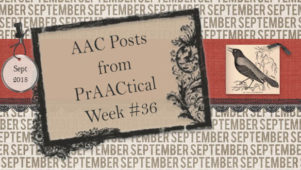
We’re saying goodbye to summer, and, heading full steam ahead into fall. Here are some posts from our prAACtical week. Monday – PrAACtically September: AAC Resources for a Year of Core Vocabulary Tuesday – AAC Link Up Wednesday – Video of the Week: Addressing the Social, Communication, and Behavioral Needs of Secondary Students with ASD using Visual Supports Thursday – Building AAC Facilitation Skills with Tabi Jones-Wohleber: MASTER PAL Training, Module 2 ::::::::::::::::::::::::::::::::::::::::::::::::::::::::::::::::::::::::::::::::::::::::::::::::::::::::::: If you have time for a bit more browsing, here are some posts you can explore. AAC Printables The Crust of AAC Every Second Counts Goodbye, Summer! A Clinician Prepares for a New School Year 3 Ways to Use AAC Goals to Strengthen Implementation
August 29, 2018
by Carole Zangari -
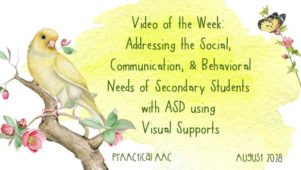
Looking for ways to better support older students with autism and related disabilities? Stay tuned because Kate Love, Autism Specialist with the Colorado Department of Education, has practical suggestions that may be of interest. The Technical Assistance System Network (TASN) of Kansas generously shares this along with a number of other wonderful resources. In this video, Ms. Love discusses several ways to implement research-supported strategies, including visual supports, with students in middle and high school. You can download the handout for this presentation using the link below or by clicking here. Direct Link to Video: https://www.ksdetasn.org/resources/793
March 15, 2018
by Carole Zangari -
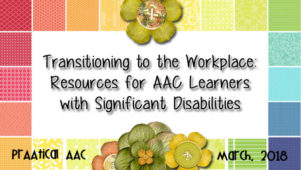
If we do our jobs well, students with AAC needs will leave school with a solid plan for post-secondary learning and/or the workplace. In most places, it can be challenging to identify meaningful work and learning experiences for young adults with AAC needs as they exit public education. While employment and educational opportunities for these young adults are slowly increasing, it is nonetheless a struggle to help young adults get prepared for their post-school lives. In this post, we share some resources that can help teams guide students and their families. QuickBook Of Transition Assessments (Cline, Halverson, Petersen, & Rohrbach, 2005) Reading-Free Vocational Interest Inventory–Second Edition (R-FVII:2) (Becker, 2000) Choose and Take Action Vocational Assessment Software (Martin, Marshall, Wray, Wells, O’Brien, Olvey, & Johnson, 2004) Self-Directed Employment: A Handbook for Transition Teachers and Employment Specialists, (Martin, Mithaug, Oliphint, Husch, & Frazier, 2002): May be out of print but available in... [Read More...]
December 4, 2017
by Carole Zangari -
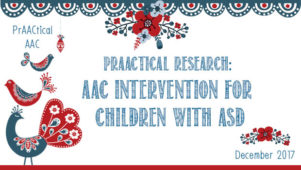
Dr. Kathy Howery is back with another helpful post an AAC research. Kathy is based in Alberta, Canada, and has worked in the field of AT and special education for over three decades. In the past year, she completed her doctoral studies where she used phenomenological methods to seek to understand the lived experience of speaking with/through a speech generating device. Kathy is currently working as a consultant to schools and school districts across Alberta focusing primarily on children and youth with complex communication needs. In this article, she discusses research on AAC interventions. Enjoy! ::::::::::::::::::::::::::::::::::::::::::::::::::::::::::::::::::::::::::::::::::::::::::::: Almirall, D. , DiStefano, C., Chang, Y.-C., Shire, S., Kaiser, A., Lu X, Nahum-Shani, I., Landa, R., Mathy, P. & Kasari, C. (2016). Longitudinal Effects of Adaptive Interventions with a Speech-Generating Device in Minimally Verbal Children with ASD. Journal of Clinical Child & Adolescent Psychology, 45(4), 442-456. What this article is all about (the focus... [Read More...]
October 14, 2014
by Carole Zangari -
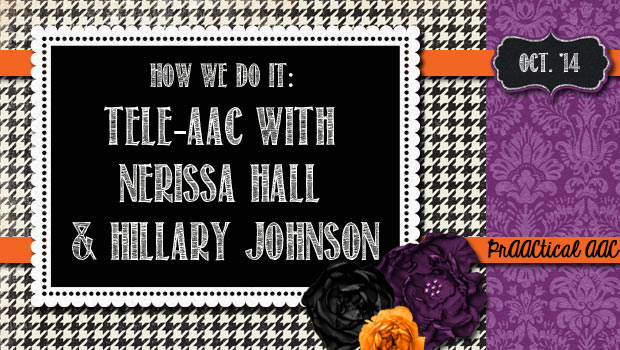
Have you been hearing a lot about telepractice lately and are wondering how that works when the client has AAC needs? In this post, we turn to Nerissa Hall and Hillary Jellison of Communicare who tell us how they use it in their clinical practice. Nerissa and Hillary are both SLPs and assistive technology practitioners specializing in AAC, AT, and telepractice/tele-AAC. They have worked together for a number of years and are the proud owners of Commūnicāre, LLC, organization based in Western Mass and CT, that offers intervention, consultation, and evaluation services focusing on supporting an individuals, or a team’s, success and independence through implementation of AAC, AT and innovative and evidence-based practices. We are committed to our clinical work, as well as translational research and are members of the C.A.R.E. Consortium. Tele-AAC: A Powerful Way of Supporting Individuals Using AAC Telepractice, which is used to provide professional services by linking clinicians... [Read More...]
August 29, 2013
by Carole Zangari -
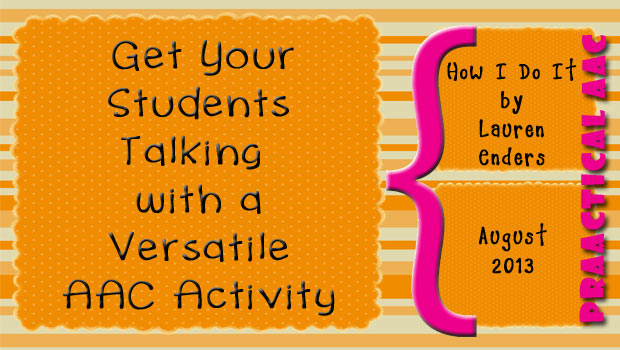
We are so excited to start off the new school year with a wonderfully prAACtical post by Lauren Enders. Lauren’s “How I Do It” posts have been very popular and this one is no different. Today, she shares ways to incorporate key AAC principles in engaging intervention activities and models that with high school students. :::::::::::::::::::::::::::::::::::::::::::::::::::::::::::::::::::::::::::::::::::::::::::::::::::::::::::::::::::::::::::::::::: LEARNING TARGETS (Samples: can be changed to meet student goals) Using core vocabulary, the student will: control the actions of others (beginning with core words like “more”, “stop”, “go”, “again”, and “different”) express his or her opinions through commenting (beginning with core words such as “like”, “don’t like”, “good”, “bad”, and “silly”) TARGET POPULATION: all ages (I have used variations of this activity successfully with students from age 3 through age 21.) TYPE OF AAC: ALL types!! What’s crucial here is the availability of core vocabulary, not the system used. Systems used can vary from... [Read More...]
August 4, 2013
by Robin Parker -
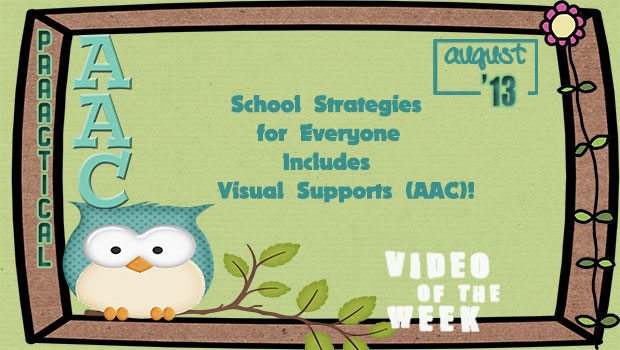
Great video for supporting students with autism in inclusive secondary settings. But, actually, these strategies can work for everyone. Most of them are just good teaching strategies. Can you count the visual strategies for understanding, for expression, for organization and behavior? Direct link to video: https://www.youtube.com/watch?v=veQKDDE9C_w” site=”youtube
February 16, 2012
by Carole Zangari -
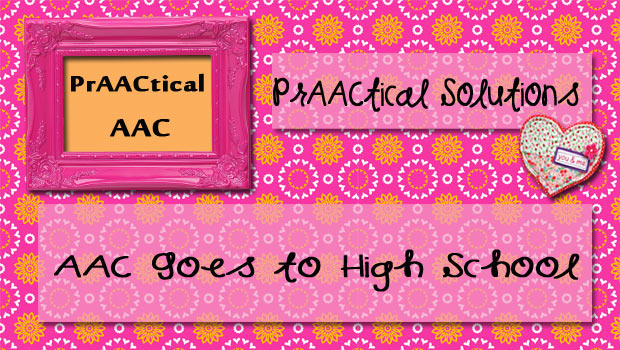
One of the reasons that we fell in love with AAC community was the seemingly boundless capacity for creativity. Creativity is something that most people associate with art and writing more than clinical work, but the reality is that creative problem-solving is a key skill among successful SLPs. As clinical educators, we’re always interested in finding ways to help our students (future SLPs) to analyze a problem situation and come up with a host of possible solutions. Creativity is enormously valuable in that process and we’re always looking for great examples of creative approaches to tough AAC problems. – So I was very intrigued by the way that educators, administrators, and therapists in British Columbia set out to help high school students with AAC needs master their systems. Approximately 5 years ago, SET-BC began the process of developing an AAC course that could be used for credit in provincial high... [Read More...]
June 24, 2019
by Carole Zangari -
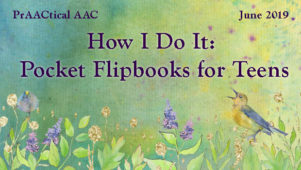
Thanks to all who reached out to express appreciation for Katherine Dally’s series on making and using flipbooks for adults and teenagers with complex communication. Today, she continues that series with a case example of how she used this to support a young woman who communicates through multiple modalities, including an SGD. Katherine is an SLP who works both as an AT consultant for an educational service center and as a home health SLP serving adults with neurological conditions in Ohio. We’re grateful to Katherine for sharing her experiences and for the downloadable materials that are linked at the end of her post If you missed her previous posts in this series, you may want to check those out: How I Do It – Pocket Flipbooks for Adults & Teens: Part 1, Part 2. :::::::::::::::::::::::::::::::::::::::::::::::::::::::::::::::::::::::::::::::::::::::::::::::::::::::::::::::::::: How I Do It: Pocket Flipbooks for Teens Let’s go through a teen case example... [Read More...]
April 11, 2019
by Carole Zangari -
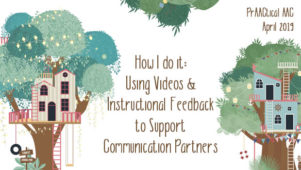
As AAC interventionists well know, we can improve learning outcomes by getting key communication partners to use specific strategies to support AAC learning. How can we do that effectively and efficiently? Today, we hear from Laura Hayes, an AAC Facilitator for Special School District of St. Louis County, Missouri. Using her 10+ years of AAC experience, Laura provides support to staff and students across 4 school districts. She has presented locally and at state, national, and international conferences, and has been involved in both inpatient pediatric and educational AAC research. Laura loves providing staff training, implementation resources and guided direction to help students using AAC succeed. In today’s guest post, she shares her experiences and tips for supporting communication partners. (Don’t forget to download the resources she is sharing before you go.) ::::::::::::::::::::::::::::::::::::::::::::::::::::::::::::::::::::::::::::::::::::::::::::::::::::::::::::::::::::::::::::::::::::::::::::::::::::::::: How I do it: Using Videos and Instructional Feedback to Support Communication Partners Prior to the Training... [Read More...]









